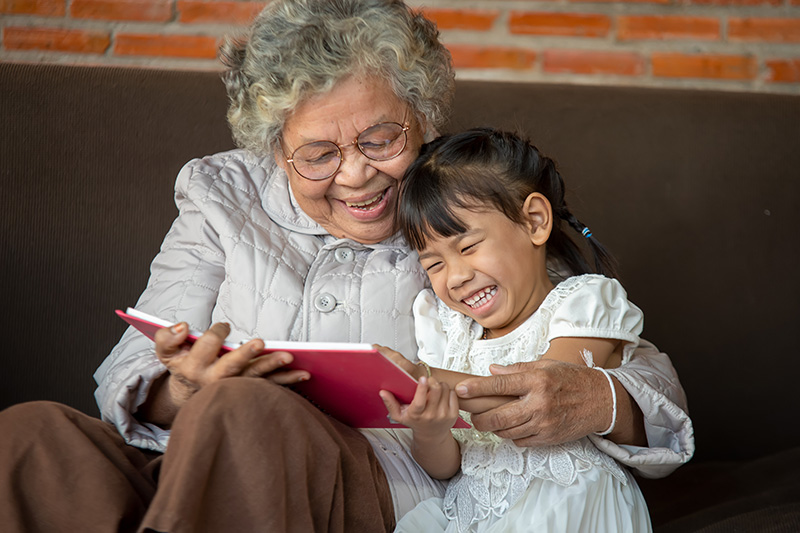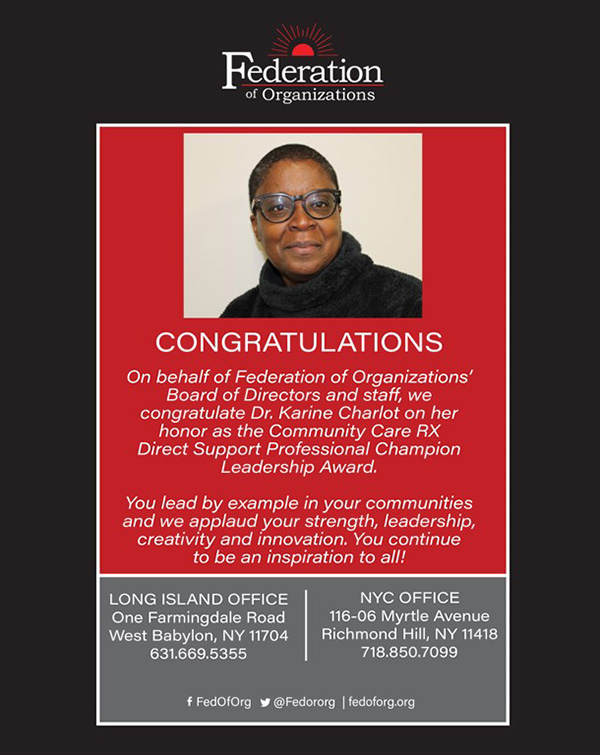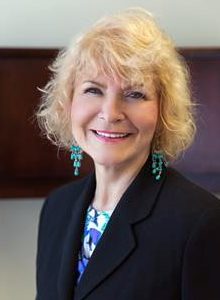Florence, a senior citizen who volunteers in the Federation of Organizations’ Foster Grandparent Program (FGP), donned a wide-brimmed hat to teach a second-grade class about the history of the Kentucky Derby. Florence read “Seabiscuit, The Wonder Horse,” which discusses the history of the storied event, and took questions from the children, many of whom were dressed up for the occasion and who excitedly stepped forward when “Grandma Florence” called on them.

Grandma Florence is one of 124 volunteers in FGP, the largest volunteer program at Federation of Organizations, a health and human services agency providing a wide variety of services to vulnerable populations in the New York City metropolitan area. FGP engages adults ages 55 and older in meaningful volunteer work in schools, childcare centers, and Head Start programs.
“FGP creates fulfilling opportunities that speak to the volunteers’ heart,” said Jessica Acevedo, FGP Program Manager. “It keeps our volunteers emotionally healthy and engaged in doing work that fills their hearts with joy. Volunteers routinely tell me, ‘I get so much more out of this than I put in.’”
FGP Program
Each “foster grandparent” is assigned to a classroom at an elementary school or a group at a daycare center or a local Head Start program. They assist the teacher or childcare worker to help meet the children’s academic, emotional, and social needs.
“The foster grandparent helps the whole class, but the beauty of the program and the real impact lies in the fact that each foster grandparent may also be assigned to work more closely with up to three children to meet whatever their needs may be,” Acevedo said. “Some needs may be academic, such as if the children are falling behind in literacy, or if they are English as a New Language (ENL) students and need extra support with language development that a teacher can’t provide while she is managing a classroom with 25 kids. Some foster grandparents work with children who need consistent redirection to stay on task or bring them back to the task, or to provide emotional support to students who are very shy or introverted.”
Perhaps the most important benefit for the children is knowing that there is someone in the classroom who truly cares about them.
“A big piece for the children is the social-emotional connection to caring older adults who are there because they want to be there – the kids pick up on this right away, and it makes such a huge difference,” Acevedo said. “The foster grandparent is there with a loving, caring heart and wants to assist in the children’s development however possible. The bond is genuine, and children sometimes tell the grandparent things they wouldn’t share with their teacher.”
At FGP, foster grandparents volunteer a minimum of five hours a week, but it can go up to 40 hours a week. The average is 15 to 20 hours weekly.
Federation launched its FGP in 1977, but it’s a national program started in 1965 by President Lyndon B. Johnson to bridge the gap between children and seniors and provide meaningful opportunities for seniors to stay connected.
About 27 percent of the Federation’s foster grandparents have been volunteering with the program for ten or more years; two have been at it for 18-plus years. More than a third (35 percent) of participants are 80 years or older, and seven volunteers are in their 90s.
Mental Health Impacts for Volunteers
Numerous studies have pointed to various positive impacts of volunteering on an individual’s mental and physical health, including providing volunteers with a sense of purpose and community. A large-scale study in the United Kingdom published in the Journal of Happiness Studies* in 2020 found that volunteering makes people happier and improves their mental health over time. The study featured data from nearly 70,000 research participants over nearly 20 years.
“FGP keeps seniors active and engaged,” Acevedo said. “It keeps their bodies and brains in motion. They feel needed and wanted, and it’s genuine; they know that these kids need them and rely on them. It forces them to get up and get dressed in the morning and show up. It fulfills so many needs for older adults, who can feel isolated, especially after losing their spouse or partner or friends, and may be wondering where to go from there. It gives them a true sense of purpose; it fills a void in their heart that is immeasurable.”
One volunteer, Grandma Phyllis, said the program has taught her how to deal with everyday problems and stress.
“This agency has given me a new lease on life,” she said. “I feel I have a purpose, and that is to help the children. They don’t realize by me helping them, they are helping me. I stand by the door and wait for them; I always get greeted with a hug and wonderful smiles.”
Further, Grandma Phyllis said, the teacher with whom she has partnered for multiple years has become a close friend.
In fact, the volunteers’ friendships that they make with teachers and other volunteers are an important benefit of the program.
“When they start, volunteers come to an orientation, which includes ice-breaker activities, and the connection between them starts there,” Acevedo said. “They forge friendships that become lifelong and that add to their connection to the program. Volunteers that serve in the same school often become close. Some of them will tell me they all met at a pool party over the summer, or they have dinner together once a month. They check on each other; it’s an amazing community.”
As seniors and as volunteers, the foster grandparents already have some things in common. “Their genetic makeup is to be good-natured, good-willed servants, which connects them naturally,” Acevedo said.
Federation provides opportunities for the volunteers to bond further.
“We usually meet monthly for training sessions,” Acevedo said. “There is a speaker, but there is plenty of free time for the volunteers to socialize with each other. We also provide a holiday recognition luncheon to thank them for their wonderful work and celebrate with each other.”
FGP During the Pandemic
The impact of FGP on volunteers’ mental health was particularly apparent when their meaningful work came to an abrupt halt in March 2020.
“Participating in the program was such a huge part of their lives, and it was suddenly taken from them,” Acevedo said. “One day they were doing this – maintaining the schedule that many have done for years – and the next day it was gone.”
The team at Federation had brainstorming sessions to think outside the box about ways to keep the volunteers engaged remotely so that they could still feel the program’s benefits, if in a different capacity. These sessions gave rise to two successful alternatives: the Special Projects Program and the Penpal Program.
“The Special Projects Program is a catchall: the volunteers do some of the work that they did in the classroom remotely,” Acevedo said. “This may include reading to the class over Zoom, working on translations from Spanish to English for the teacher, doing cutouts for an arts and crafts project, or doing other clerical work to assist the teacher.”
With the Penpal Program, the foster grandparents exchange letters with the children. This allows the volunteer and the children to continue their relationship while allowing the children to work on their reading and writing skills.
Federation was able to find remote program placements for many of the foster grandparents. In the early days of participating in the Special Projects Program, Grandma Rose Mary wrote to Federation, “I miss having a purpose each day. But I’m happy to report my teacher, Jennifer, is keeping me busy virtually. I made her door decorations and bulletin boards on my floor and sent her all the pieces. This was a great idea to keep me busy. I have somewhat of a purpose now. I still miss my babies, but this is my connection.”
Grandma Candy participated in the Penpal Program. “Your letters are the best part of my day,” she wrote to one of the children. “I run to the mailbox to check for my penpal letters.”
The aforementioned Kentucky Derby lesson was done remotely, with Grandma Florence reading and communicating with the children over Zoom. She also exchanged letters with the children.
“All my little cherubs thanked me for my letters,” she said, adding that the children’s letters have “helped me to survive quarantining.”
Federation has begun transitioning the foster grandparents back to in-person placements this school year and has resumed holding live monthly meetings for the volunteers.
Barbara Faron is the CEO of Federation of Organizations.
References
Journal of Happiness Studies, “Does Volunteering Make Us Happier, or Are Happier People More Likely to Volunteer? Addressing the Problem of Reverse Causality When Estimating the Wellbeing Impacts of Volunteering. Authors: Ricky N. Lawton, Iulian Gramatki, Will Watt, Daniel Fujiwara, published online March 17, 2020.








